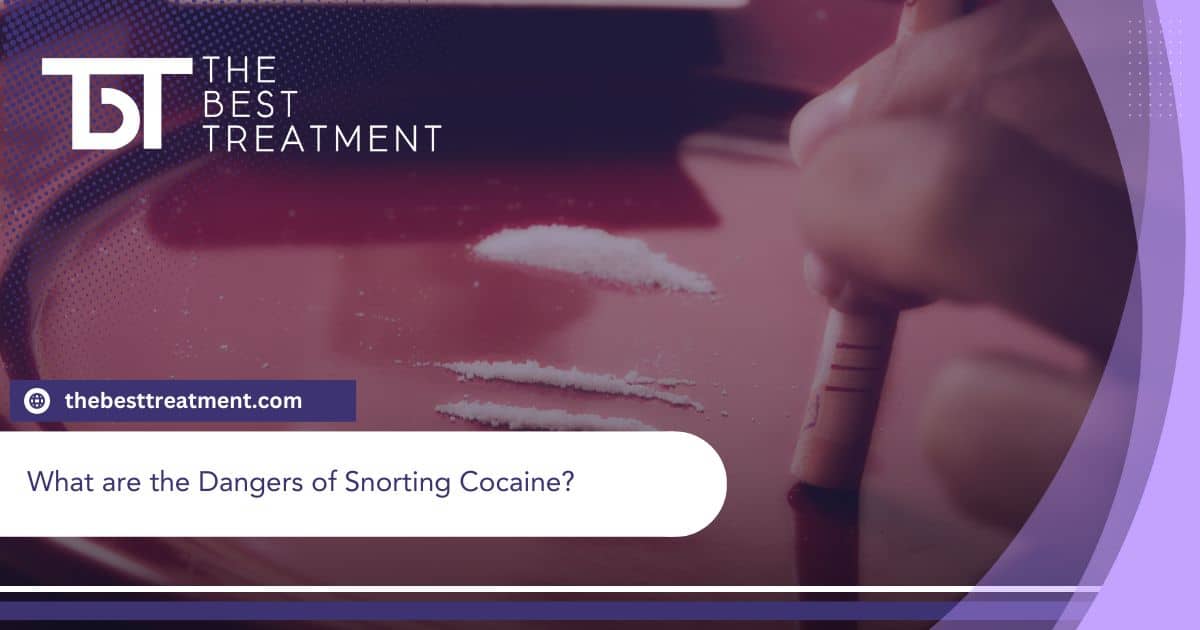Table of Contents
Cocaine is a potent and addictive stimulant drug that many people snort to experience a high. According to the National Institute on Drug Abuse (NIDA), nearly 5 million people reported abusing cocaine in 2021.[1]
If you or a loved one abuse cocaine, you probably understand how difficult it can be to stop. Unfortunately, snorting cocaine long-term can lead to an array of unwanted side effects, addiction, permanent damage to the nose, respiratory issues, and life-threatening overdoses.
Because of the long-term dangers of snorting cocaine, you should always seek professional help when you are struggling with addiction. Drug rehab programs can offer you the tools and support you need to achieve long-lasting sobriety and regain control over your life.
What are the Effects of Snorting Cocaine?
People who snort cocaine do so to experience a rush of energy, increased self-confidence, and feelings of euphoria. However, cocaine can cause a wide range of physical and psychological side effects.
The possible effects of snorting cocaine include the following:[2]
- Dilated pupils
- Heightened energy
- Increased confidence or feeling invincible
- Increased body temperature
- Fast heart rate
- High blood pressure
- Hypersensitivity to sight, sound, and touch
- Decreased appetite
- Poor sleep
- Irritability, agitation, or aggression
- Anxiety and panic
- Paranoid thoughts
- Shaking and tremors
- Muscle twitching
- Dizziness
Due to the possibility of negative reactions such as increased heart rate, paranoia, and aggression, it is best to avoid snorting cocaine. If you or a loved one have a difficult time stopping your cocaine use, it’s time to seek drug rehab services.
What are the Dangers of Snorting Cocaine?
In addition to adverse side effects, there are a few dangers associated with snorting cocaine. Being aware of these risks can motivate you or your loved one to seek professional help for your cocaine use.
The main dangers of snorting cocaine include:
Addiction
While snorting cocaine is the most common way to abuse it, it also puts you at a high risk of developing an addiction. Insufflation allows the cocaine to travel into your brain and bloodstream quickly, causing more intense effects than some other methods of administration. Even though this might seem appealing if you are abusing cocaine, you could develop an addiction rather quickly.
Some common signs of cocaine addiction include:
- Using cocaine in higher doses or for longer than intended
- Having a hard time controlling how much cocaine you use
- Desiring to quit or cut back on cocaine use but being unsuccessful
- Experiencing strong urges or cravings to use cocaine
- Continuing to use cocaine despite experiencing adverse social, financial, health, or psychological effects
- Needing a higher dose of cocaine to experience the desired effect
- Experiencing withdrawal symptoms when you cannot snort cocaine
Nasal Issues
One of the most frequently experienced risks of snorting cocaine is nasal issues. Insufflation can cause nasal inflammation as well as tiny cuts throughout the nasal passage. Not only does this increase your risk of infections, but long-term cocaine insufflation can lead to frequent nosebleeds and permanent structural damage to the nose.
Studies have found that snorting cocaine can cause septal chondritis and nasal bone osteomyelitis, which leads to a severe loss of cartilage and eventually a total collapse of the nose.[3] This damage is permanent and requires surgeries to correct.
Respiratory Risks
If you have been snorting cocaine long-term, you could experience a wide range of respiratory issues. For starters, you could develop infections in your respiratory system because your nasal passages are directly connected to the respiratory tract.
Even further, long-term snorting of cocaine can cause the following respiratory issues:[4]
- Pulmonary edema (too much fluid in the lungs)
- Pulmonary hemorrhage (bleeding in the lower respiratory tract)
- Pulmonary barotrauma (too much air pressure in the lungs)
- Asthma
- Shortness of breath, coughing, and wheezing
- Hemoptysis (coughing up blood)
Overdose
Lastly, snorting cocaine can lead to life-threatening overdoses when you are consuming large doses in short amounts of time. Unfortunately, many people binge on cocaine as the effects are short-lived, making overdoses common.
The signs of a cocaine overdose include:[5]
- Raised blood pressure
- High body temperature
- Agitated movements
- Restlessness
- Teeth grinding
- Nausea and vomiting
- Accelerated heart rate
- Tremors
- Chest pain
- Sweating
- Incontinence
- Breathing difficulties and a blue tinge to the skin
- Loss of consciousness
- Seizures
Cocaine overdoses can cause severe cardiovascular effects such as organ failure, internal bleeding, or heart attack, so you should always contact emergency medical services immediately if you suspect an overdose.
Find Help for Cocaine Abuse and Addiction
If you or a loved one frequently snorts cocaine despite the wide range of risks, it’s time to consider professional addiction treatment. At The Best Treatment Center, we operate under a principle of compassion and empathy while providing evidence-based practices to ensure the best shot at recovery possible.
To learn more about our cocaine addiction treatment program, contact us today.
References:
- The National Institute on Drug Abuse (NIDA): What are the short-term effects of cocaine use, Retrieved January 2024 From https://nida.nih.gov/research-topics/cocaine#short-term
- The National Library of Medicine (NLM): Reconstruction of the nose damaged by cocaine, Retrieved January 2024 From https://pubmed.ncbi.nlm.nih.gov/11214057/
- The National Library of Medicine (NLM): Respiratory complications of cocaine abuse, Retrieved January 2024 From https://pubmed.ncbi.nlm.nih.gov/1589607/
- The National Library of Medicine (NLM): Cocaine Toxicity, Retrieved January 2024 From https://www.ncbi.nlm.nih.gov/books/NBK430976/
Medically Reviewed: September 25, 2019

All of the information on this page has been reviewed and verified by a certified addiction professional.










